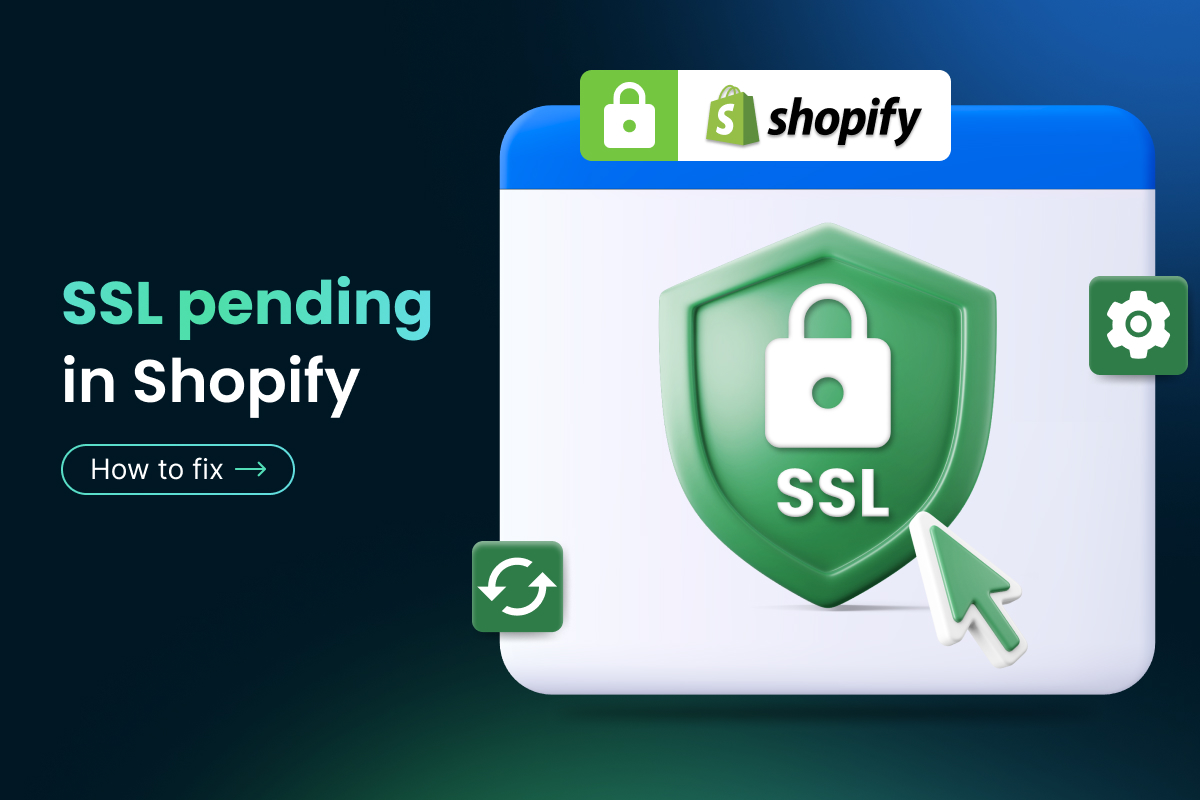Table of Contents
Do you know what does SSL pending mean on Shopify? It is a security measure that enables online stores to securely process transactions. If your store is displaying the “SSL Pending” warning, it could be due to an issue with your certificate or configuration settings.
Consequently, this can cause issues with security and customer trust, which is why it’s important to address the issue as soon as possible.
In this article, we’ll discuss what does SSL pending mean on Shopify and how to fix the issue quickly. With this knowledge, you’ll be able to keep your online store safe and running smoothly!
What is an SSL Certificate?
An SSL Certificate (Secure Socket Layer Certificate) is an important security feature for any website, regardless of the size or type of business. It helps to protect sensitive data that is transmitted across the Internet by encrypting the information so it can only be read by authorized individuals.
Besides, SSL Certificates also help to increase customer trust and confidence by displaying a secure lock icon in the browser. This is an important element for e-commerce businesses that are selling services online, as customers may be hesitant to share their card details if they feel like the website isn’t secure.
An SSL Certificate will give them peace of mind that their details are safe and help to convince them to make a purchase.

SSL Certificates displays a secure lock icon in the browser
All in all, an SSL Certificate provides proof of identity and legitimacy so customers have greater assurance when engaging with websites they are unfamiliar with. By implementing an SSL Certificate, you are helping to establish trust and safety for online activities that take place on your website.
| 💡Learn more about Shopify here: |
What are the advantages of owning an SSL Certification on your Shopify store?
- SSL Certification boosts the trust of your customers in their online shopping experience.
- An SSL Certificate ensures that all webpages are secure, thus protecting your customer’s privacy.
- Having an SSL Certification on your store will help improve your search engine rankings because many major search engines like Google prioritize secure websites.
- An SSL Certificate also helps to prevent phishing attacks by ensuring that the website address is legitimate and not a fake site created by cybercriminals.
- Owning an SSL Certification ensures you are compliant with data security regulations, such as GDPR and PCI DSS. It helps to protect your customers’ data and build consumer confidence.
Does Shopify Provide Free SSL Certificates?
Yes, Shopify provides free SSL certificates which are essential for providing a secure connection between your website and visitor’s browser.
When customers visit your store, the HTTPS protocol ensures that their information is encrypted and protected from online security threats. This gives them peace of mind when entering personal details during checkout and allows them to trust you with their confidential data.

The HTTPS protocol ensures that customers’ information is encrypted and protected
In addition to providing free SSL certificates, Shopify provides a fraud-prevention system that monitors activities within your store for suspicious or unauthorized activity. Furthermore, the platform has a secure checkout feature that allows customers to purchase without entering their credit card information.
This adds an extra layer of security and encourages potential customers to make purchases without worrying about their data being stolen.
Overall, Shopify provides important security tools to ensure your online store is safe and secure for both customers and merchants. With their free SSL certificates and other safeguards in place, you can rest assured that your store is protected from cyber threats.
How to Fix Pending SSL Certificate On Your Shopify Store
When your Shopify store is SSL-enabled, it means that information sent to and from the website is encrypted over a secure connection.
However, even if SSL is enabled, this does not guarantee that your server and content meet the encryption standard. This is why you may still see “SSL Pending” in your Shopify store.
In other words, to make sure your store meets the encryption standard and is truly secure, you must have it verified by Shopify. Once this verification has been completed, “SSL Pending” will no longer appear in your store, and customers can feel confident knowing their information is securely protected.
Here are some ways you can fix the SSL Pending status:
1. Check your A records
If you see “SSL Pending” instead of “SSL Unavailable,” it may imply that all of your DNS settings are correct except for your A records. To set up the A records correctly, enter 23.227.38.65 as the address. If you need help setting up the records, just contact your domain host.
2. Check your CNAME records
It is essential to check that your domain name for your Shopify store is referenced with a CNAME record and not an IP address. It means that you will need to update the CNAME record so that it points toward shops.myshopify.com.
Therefore, you can ensure that all DNS information associated with your domain name is properly transferred to the correct location. Once you have made this change, your domain can be used for your Shopify store.
3. Seek for help
It is important to remember that the propagation of any changes made to your domains can take up to 48 hours. Before seeking assistance from a third-party host, Shopify customer service, or IT company for help with securing your store, you should wait at least two days. This two-day period allows time for the modifications to be multiplied throughout your store, increasing the chances of successful resolution.
How to Add SSL To Shopify?
The process of adding an SSL certificate to your Shopify store is simple. After your domain has been properly associated with your Shopify store, you will immediately acquire an SSL (also known as a TLS – Transport Layer Security) certificate across each URL when you start a new Shopify online store.
However, if you encounter any issues with your SSL certificate, there are a few steps you can take to troubleshoot the issue.
The first step is to check if your host and any CDNs you use also support SSL. If not, the SSL certificate won’t be properly applied. You should also make sure that each link on your site contains the prefix HTTPS instead of HTTP, because this will indicate whether or not the SSL certificate was processed correctly.
If you find that your SSL certificate is not validating, you may need to reach out to the certificate issuer and ask them to reissue it. This can happen if there are any changes made on your server.
In addition, you should also check with Shopify Support for any other steps you may need to take. Shopify has a team of professional Shopify experts and Shopify partners who are always ready to help you fix problems and run your store smoothly.
Finally, you should be aware that there are many potential causes for an SSL failure, such as website design flaws, domain misconfiguration, or site refresh delays. It is essential to identify and fix these issues quickly to ensure a secure browsing experience for your website visitors.
What Does SSL Pending Mean On Shopify?
When a customer logs in to your Shopify store, they can see an SSL pending error message although the certificate’s processing isn’t complete. So what does SSL pending mean on Shopify?
It means that your website is not protected from hackers and is accessible to the general public. Hence, the customers’ information may not be secure, and they will feel reluctant to share the information when using your website.
Additionally, the lack of an SSL certificate can be a result of Shopify not having confirmed that your server and content adhere to the encryption requirement.
That’s why during the SSL pending period, you should make sure all the necessary materials and server info are properly submitted and up-to-date with your website so that the verification process is smooth and successful.
In particular, this includes things like providing the exact domain name, accurate and up-to-date content and verifying that you have an active subscription to a valid SSL certificate provider.
If you’re running into problems with SSL being unavailable on your Shopify store, there are a few steps you can take to try and fix the issue.
1. Wait for 48 hours
If you have confirmed that your website is following the encryption protocol requirements and are still having issues, it may be best to give it 48 hours. SSL certificates need time to be verified or renewed after making any changes to the server or custom domain, so this wait period is necessary.
On average, it should take about two days for HTTPS:// encryption to be fully installed.
However, if this waiting period is not enough to fix the problem, you may need to seek assistance from a professional on Shopify. There could be other underlying issues that require an expert’s touch and knowledge.
2. Check your domain record
If you have an online store on Shopify, you may need to manually add your custom domain if it isn’t already built into your shop’s admin panel. In other words, instead of Shopify automatically handling the settings for you, you will have to do this yourself.
3. Remove IPv6 records
Using an IPv6 (AAAA) record can be the cause of a failed HTTPS:// encryption attempt on your Shopify URL. To ensure a successful SSL certificate, you should use an IPv4 Address Record Type instead.
4. Edit your CAA records
CAA Records may slow down the process of acquiring a secure HTTPS:// address for your site. As a result, it is not recommended to use CAA Records on Shopify.
Conclusion
By taking the time to understand what does SSL pending mean on Shopify and how to fix it, merchants can ensure that their customers’ information remains safe and secure. It will help to boost customer trust and loyalty, as well as increase overall sales.
Besides, merchants should always take the necessary steps to protect their customers by properly configuring their domain and SSL certificate. Doing so will go a long way in providing a safe, secure shopping experience for all customers.


